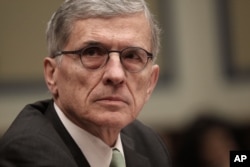Advocates for net neutrality won a significant victory Tuesday when a federal appeals court ruled that the internet is effectively a public utility, upholding a hotly contested regulation requiring broadband firms to treat all online traffic equally.
But what does that mean for U.S. consumers and internet service providers?
What is net neutrality?
Net neutrality is the concept of barring service providers from blocking, censoring or discriminating against any content provider. Under this principle, companies that provide internet access to most homes and businesses are prohibited from favoring one website over another or punishing sites because of their business practices or political positions.
How is the government involved?
The U.S. Federal Communications Commission proposed rules to make sure cable and phone companies don't manipulate traffic. They can't create special fast lanes for some data, like video from YouTube, or intentionally block or slow web traffic.
Why is the industry opposed to the idea?
The ruling gives the FCC the power to regulate the internet more strictly. Companies say the stricter regulation will undermine investment in broadband, and that it's not clear what is and isn't allowed under the greater authority the FCC has to investigate unspecified complaints.
But President Barack Obama last year said the new rules would protect innovation, while allowing equal opportunity for the next generation of entrepreneurs, large and small.
The service providers also are concerned about price regulation, even though the FCC has said it won't preapprove prices for service.
How does this affect consumers?
"Today's ruling ... ensures the internet remains a platform for unparalleled innovation, free expression and economic growth," FCC Chairman Tom Wheeler said in a statement.
The agency already has proposed making it harder for broadband providers to use consumer data for advertising purposes.
What happens next?
Tuesday's ruling is expected to be appealed, but it’s not clear yet that the Supreme Court will choose to hear it.
Much also will depend on the outcome of the presidential elections in November. It is customary for the FCC chairman to resign to make room for a new appointment after a presidential election. If the new chairman is appointed by presumptive Republican nominee Donald Trump, it is likely the new appointee will work to overturn the agency’s net neutrality rules.






